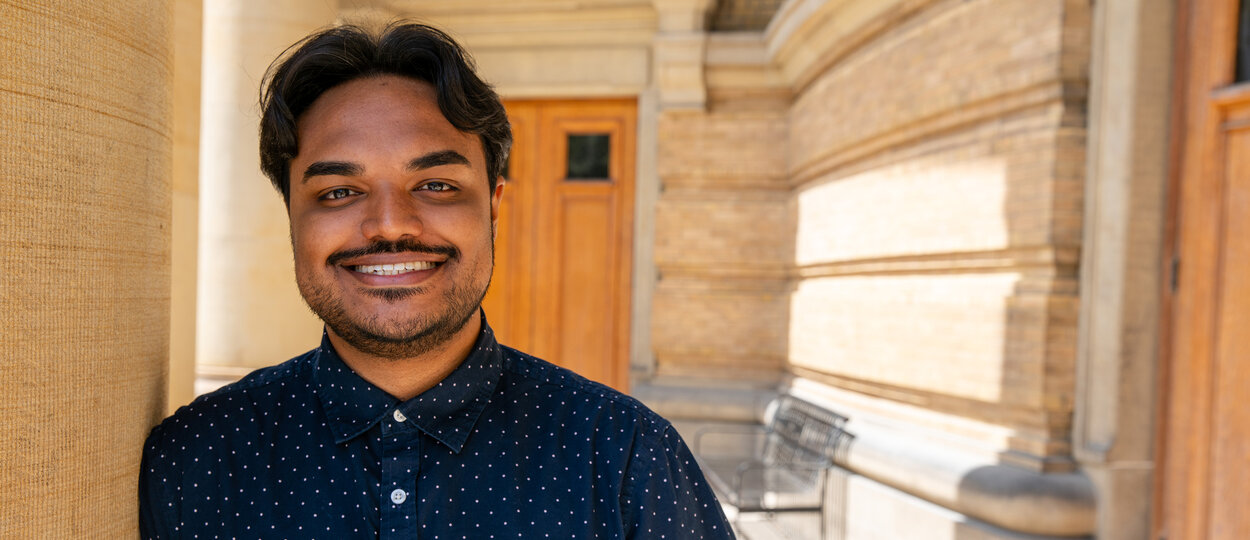Al-Amin Ahamed says they are inspired by classmates and hopeful for future of pharmacy profession
When Al-Amin Ahamed, valedictorian of the 2T4 Doctor of Pharmacy (PharmD) class, started their degree in the first year of the COVID-19 pandemic, they and the rest of the cohort had to adapt to the unique challenges of learning during the pandemic, and a profession that was rapidly evolving to meet health care needs.
Looking back, Ahamed says that those challenges have helped prepare their class to take on whatever may come next.
“Our class is uniquely prepared to tackle many of the different challenges that we see in pharmacy practice, having experienced so many of these challenges ourselves early on during our degree,” says Ahamed. “The pharmacy profession is rapidly evolving now, with a new generation of pharmacy practitioners at the helm of that change and motivated to make a difference in patient care.”
Ahamed, who grew up in New York and Scarborough in a first-generation immigrant family, earned a Bachelor of Science (Honours) in 2020, double majoring in human biology and nutritional sciences at U of T. After volunteering in a community pharmacy during their undergraduate degree, they decided to pursue the Doctor of Pharmacy program at the Leslie Dan Faculty of Pharmacy.
“I loved having a patient-facing role in the community, doing something meaningful, and encouraging patients to use their medications safely,” says Ahamed. “Having a platform to make a difference in people’s lives consolidated what my parents empowered me to achieve and the impactful role I wanted to have in supporting my community.”
As the COVID-19 pandemic changed some parts of pharmacy practice – with pharmacists and pharmacy students taking on expanded roles as immunizers and sources of information when patients couldn’t reach their physicians – Ahamed says they valued the experiential learning opportunities throughout the degree to see the profession in various settings. From rotations in direct and non-direct patient care to working in the Discovery Pharmacy at the Leslie Dan Faculty of Pharmacy, along with courses toward the Certificate in Global Studies, Ahamed was able to experience the breadth of the pharmacy profession.
“The PharmD curriculum helped me figure out what I wanted to do within the large pharmacy landscape, and it gave me the opportunity to meet and network with people from so many different fields.”
“The PharmD curriculum helped me figure out what I wanted to do within the large pharmacy landscape, and it gave me the opportunity to meet and network with people from so many different fields,” Ahamed says.
Ahamed was also involved in extracurricular activities and leadership roles during their PharmD. In particular, they were co-president of PharmaPride from 2021 to 2023, helping to lead initiatives to make the Faculty more inclusive, such as working with faculty and staff to raise the progress pride flag hung in the Faculty building’s atrium. In second year, Ahamed and three of their classmates secured first prize in the Business Plan Competition for their pitch to develop a harm reduction tool that improves access to drug checking services for people who use drugs. They were also president of the Undergraduate Pharmacy Society during their third year and helped students navigate the transition back to in-person learning.
Ahamed plans to build a career focused on equity and inclusive care
All of these experiences helped solidify Ahamed’s interest in health equity. In August, Ahamed will start a one-year Master of Public Policy at McGill University to explore drug policy and how it can be more equitable and inclusive for marginalized groups. Ahamed received a prestigious McCall MacBain Scholar Award, which fully funds a master’s or professional degree at McGill University and provides access to mentorship and a leadership program, to continue his education.
“The PharmD has made me a drug expert and given me a strong foundation in public health, health care, and the patient care process. I hope to combine all these things with what I learn in my public policy education to then work to make meaningful changes in these areas,” says Ahamed. “I believe pharmacists should have a more hands-on role in health administration, governance, and policy-making. With my interest in health equity, I felt like this was the most obvious way for me to go.”
Ahamed remains passionate about caring for patients and plans to build a career that includes direct patient care, research, and policy to advance health equity for marginalized peoples. And, as they prepare for the next stage of their career, they are inspired by their classmates, who are all working toward making a difference for patients in various ways.
“Our class is capable of doing so much, and I see them striving to do incredible things, which is helping motivate me to do the same,” says Ahamed. “I’m very hopeful about the future of pharmacy practice, and I’m so thankful and inspired that my classmates are taking action with what they’ve learned to make a difference.”
More News
Image

PharmD student receives Volunteer Award from Life Sciences Ontario
Simonne Rauch is recognized for her contributions to ambassador and mentorship programs.
Read More
Image

Celebrating Excellence: Mike Folinas Receives 2024-25 Exemplary U of T Ambassador Award
Mike Folinas has received the 2024–25 Exemplary U of T Ambassador Award for his outstanding service and leadership in supporting the academic community.
Read More
Image

Structural biology research takes aim at rare neurodegenerative disease
Rachel Harding leads research to understand protein responsible for Huntington’s disease and advance drug discovery
Read More
